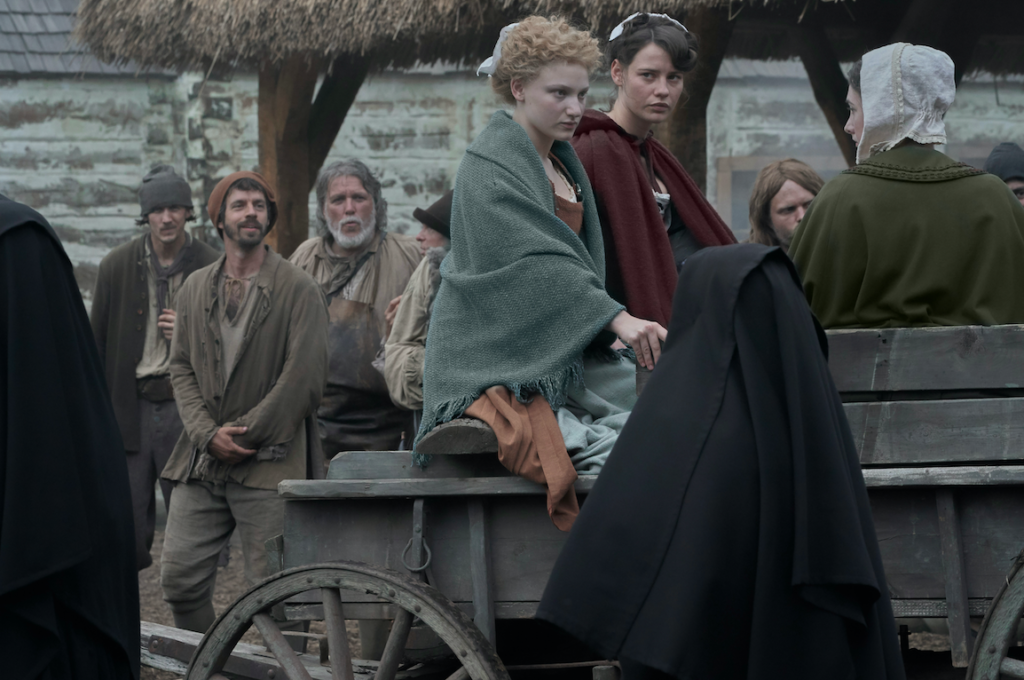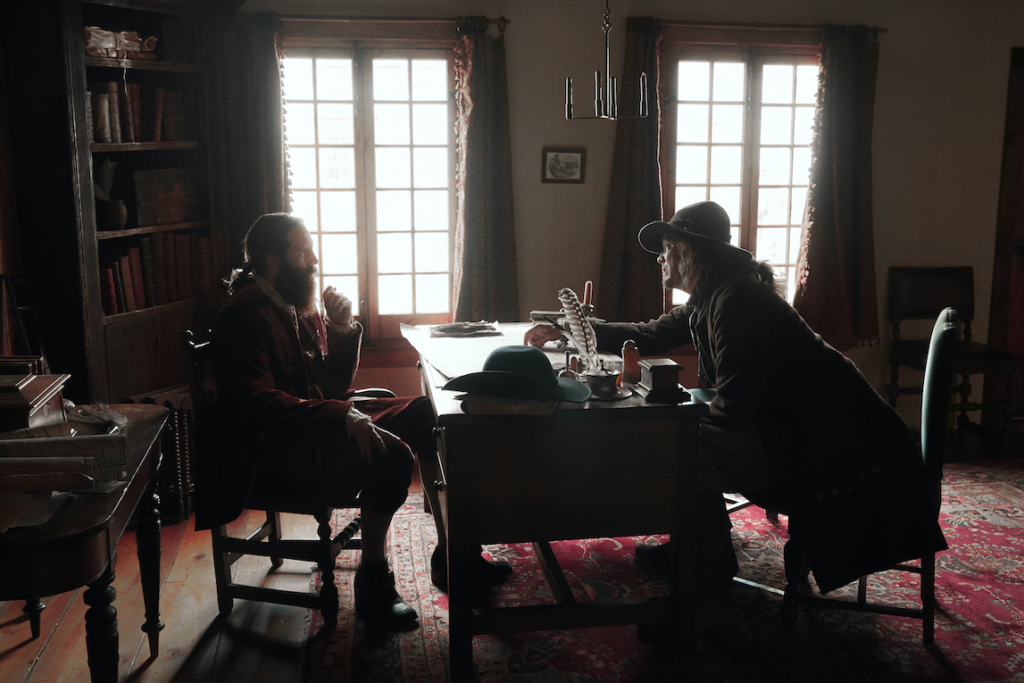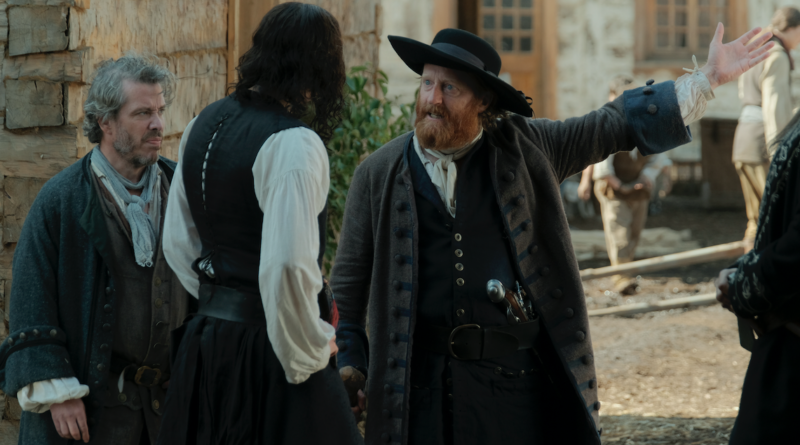INTERVIEW: Unearthing the poignant depths of ‘Barkskins’
Photo: Captain Bouchard (David Wilmot) argues with Hamish Goames (Aneurin Barnard) on an episode of Barkskins on Nat Geo. Photo courtesy of National Geographic / Philippe Bosse.
Barkskins, the new limited series from National Geographic, follows a group of settlers in 1690s New France after a battle breaks out between warring factions in the rugged local area. A massacre has taken place, and fingers have been pointed amongst the new and established communities in the northern reaches of a land that is today Quebec.
The series, lasting eight installments, plays new episodes Mondays at 9 p.m. on the network. The story is based off the acclaimed novel by Annie Proulx. The cast features Marcia Gay Harden as Mathilde Geffard, David Thewlis as Claude Trepagny, Tallulah Haddon, Lily Sullivan, Kaniehtiio ‘Tiio’ Horn, David Wilmot and Thomas M. Wright, among others.
Audience members have gotten to know a few key characters, including Elisha Cooke (Wright), who is billed as a cutthroat barrel maker; Constable Bouchard (Wilmot), King Louis XIV’s local man in New France; and Delphine (Sullivan), a so-called “Filles du Roi” who has a terrible secret, according to press notes.
Recently Hollywood Soapbox had the chance to talk with Sullivan, Wilmost and Wright about their time filming the limited series. Here’s what they had to say …
On whether they were familiar with Proulx’s original novel …
SULLIVAN: “I hadn’t read the novel, but obviously [I’m] a fan of Annie Proulx’s work. But after reading the script and then familiarizing myself with the novel, I just loved how it explores man’s strikingly different reactions to the seemingly limitless and impenetrable forest, and how man either adapts or shapes himself to the forest or tries to own and dominate it. I feel it’s very current and an important thing to explore and to jump back in time.”
WRIGHT: “It laid the foundation for where we’re at today. The land had to be cleared. This is the point in which the acceleration and the change in this planet is really beginning. We’re beginning to shape it and to ruin it.”
SULLIVAN: “And in period pieces, I feel like you get to explore a crossroad, whether it be as an individual or as a society.”


On the difficulties of getting portraying characters from 500 years ago …
SULLIVAN: “For us, we’re very lucky that we weren’t on the stage, and we got to shoot in the actual wilderness that these people once lived, and explore the actual land and shoot in this real-sized village.”
WRIGHT: “The past is very present in Quebec. It’s very visible. I think it’s the only walled city in North America, and so that’s a very particular mentality. Then we’d get up every day, and we’d drive almost an hour out to this enormous real town. It’s extraordinary how little work is required when that’s happening. You give over to it.”
WILMOT: “The language is kind of archaic and long-winded. It’s a real feast for an actor. Thomas is particularly verbose in it — nails it. The language is one of those things that is out of the ordinary as much as the location. It was really rich — really, really rich.”
[Read Hollywood Soapbox’s previous interviews with cast members of Barkskins.]
On how Barkskins speaks to 2020 …
WILMOT: “The only thing that strikes me is that we can’t conceive of ourselves without an economy, so it’s this silent threat. And yet we’re all just trying to get our economies back. I think that’s what I was thinking today preparing for this. It’s all about economy and forward march.”
WRIGHT: “It’s also about your smallness in the face of the natural realm, and I think humans have a tendency toward hubris and seeing ourselves as these gods. And we’re really not. We’re really extremely vulnerable, physical beings, and I think that was something that was very evident being in that landscape then. There were gods and monsters around those people because the forces around them were so much larger than them. That was the only language they had to really translate it. I think COVID has been that, too. I think there’s certain things that truthfully are very healthy for human beings to acknowledge. We’re not gods. We’re vulnerable, and we should be vulnerable. And I think that ties into having some respect for the environment that you’re in and respect for the planet.”
SULLIVAN: “Humans and people that are displaced, immigration and migration and colonization and ways we’re still not treating the environment. We have … the First Nation people in the show and languages that haven’t been heard on the screen before internationally, which is so, so exciting. I think even having the two villages as a juxtaposition to see almost the crossroad of which way civilization can go in the way of man trying to dominate and the other way, which is man trying to shape himself to it. They would move their villages every 20 years to re-set up so they weren’t fully using all of the resources, whereas we just kept expanding, expanding, expanding multiple times.”
By John Soltes / Publisher / John@HollywoodSoapbox.com
Barkskins, featuring Lily Sullivan, David Wilmot and Thomas M. Wright, plays Mondays at 9 p.m. on National Geographic. Click here for more information.

